

Biotechnology in European patents - threat or promise? Split views and a growing market Opinions on patents in the field of biotechnology are divided, with support for unfettered scientific progress at one end of the spectrum and a commitment to uphold the basic values of society at the other.
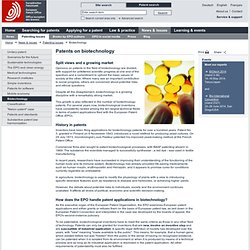
Where many see an important contribution to social progress, others are concerned about potential risks and ethical questions. Despite all the disagreement, biotechnology is a growing discipline with a remarkably strong market. How California's GM food referendum may change what America eats. In the US, an estimated 70% of items on supermarket shelves contain GM ingredients, commonly corn, soy and canola oil products.
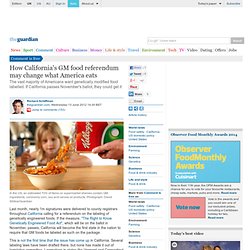
Photograph: David Sillitoe/Guardian Last month, nearly 1m signatures were delivered to county registrars throughout California calling for a referendum on the labeling of genetically engineered foods. Cases and Codes. Scion’s Field Trial Deliberately Destroyed. 13 April 2012A field trial of genetically modified radiata pine trees planted in a secure site at Scion’s Rotorua campus was deliberately destroyed during the long Easter weekend.
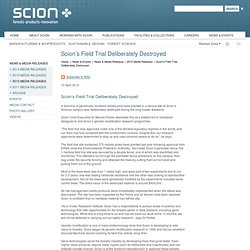
Scion Chief Executive Dr Warren Parker describes this as a blatant act of vandalism designed to end Scion’s genetic modification research programme. “The field trial was approved under one of the strictest regulatory regimes in the world, and our team has fully complied with the containment controls. Despite this, our research opponents were determined to stop us and used criminal means to do so”, he says. The field trial site contained 375 radiata pines trees planted last year following approval from ERMA (now the Environmental Protection Authority).
Set inside Scion’s perimeter fence, the 1-hectare field trial site was secured by a double fence, one of which was electrified and monitored. All risk management safety protocols were immediately implemented when the attack was discovered. Warning on GM laws. New Zealand's genetic modification laws could be threatened as part of the Trans Pacific Partnership agreement, the Sustainability Council warns, and it wants assurances they wont be weakened.

Synthetic Biology Does Not Need Regulation Now, Panel Says. Monsanto's Harvest of Fear. Monsanto next petitioned to make potential damages punitive—tripling the amount that Pilot Grove might have to pay if found guilty.

After a judge denied that request, Monsanto expanded the scope of the pre-trial investigation by seeking to quadruple the number of depositions. “Monsanto is doing its best to make this case so expensive to defend that the Co-op will have no choice but to relent,” Pilot Grove’s lawyer said in a court filing. With Pilot Grove still holding out for a trial, Monsanto now subpoenaed the records of more than 100 of the co-op’s customers. In a “You are Commanded … ” notice, the farmers were ordered to gather up five years of invoices, receipts, and all other papers relating to their soybean and herbicide purchases, and to have the documents delivered to a law office in St.
Louis. Whether Pilot Grove can continue to wage its legal battle remains to be seen. Chemicals? The Regulation of GMOs in Europe and the United States: A Case-Study of Contemporary European Regulatory Politics. This paper was prepared for a workshop on trans-Atlantic differences in GMO regulation sponsored by the Council of Foreign Relations.
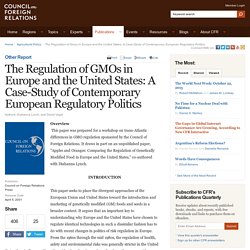
It draws in part on an unpublished paper, "Apples and Oranges: Comparing the Regulation of Genetically Modified Food in Europe and the United States," co-authored with Diahanna Lynch. US Farmers Sue Monsanto Over GMO Patents, Demand Right To Conventional Crops. The Public Patent Foundation filed suit yesterday against Monsanto’s patents on genetically modified seeds with farmers asking to be protected against the biotechnology giant’s potential lawsuits in case of accidental contamination from plants grown with its seeds.

On behalf of 22 agricultural organisations, 12 seed businesses and 26 farms and farmers, the Public Patent Foundation (PUBPAT) is suing the biotech company in the federal district court in Manhattan and assigned to Judge Naomi Buchwald. The organic plaintiffs had to pre-emptively protect themselves from potential patent infringement in case of accidental contamination of their crops by genetically modified organisms (GMOs), said PUBPAT. “This case asks whether Monsanto has the right to sue organic farmers for patent infringement if Monsanto’s transgenic seed should land on their property,” said Dan Ravicher, PUBPAT’s executive director and a law professor at Benjamin N. Yale Journal of Medicine & Law: An Undergraduate Publication. The possibilities that genetically modified crops can bring about are incredible.
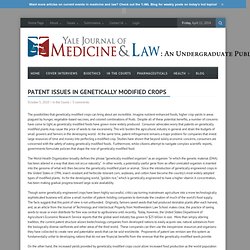
Imagine nutrient-enhanced foods, higher crop yields in areas plagued by hunger, vegetable-based vaccines, and colored combinations of fruits. Despite all of these potential benefits, a number of concerns have come to light as genetically modified foods have grown more widely produced. Nsumer Protection and GM Labelling – A Legal Industry Perspective. (a) Some differing views on the New Zealand (and Australian) legal regimes “Australia and NZ have one of the most comprehensive labelling regimes for GM in the world”: FSANZ, Review of Labelling of Genetically Modified Food, May 2004.
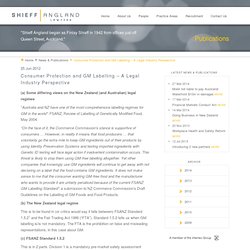
“On the face of it, the Commerce Commission’s stance is supportive of consumers … However, in reality it means that food producers … that voluntarily go the extra mile to keep GM ingredients out of their products by using Identity Preservation Systems and testing imported ingredients with Genetic ID testing will face legal action if inadvertent contamination occurs. This threat is likely to stop them using GM-free labelling altogether.
Yet other companies that knowingly use GM ingredients will continue to get away with not declaring on a label that the food contains GM ingredients. (b) The New Zealand legal regime This is to be found in (or critics would say it falls between) FSANZ Standard 1.5.21 and the Fair Trading Act 1986 (“FTA”). This is in 2 parts.